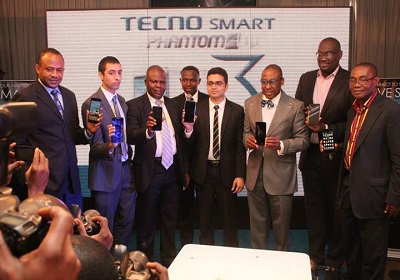Telecom
TECNO Mobile Reassures of Improved Innovative Technologies

Globally, successful brands share one thing in common-high quality. It appears TECNO Mobile is not left out in the universal trend of unique brand development, as it reassures customers in Africa of high quality product offerings, affordability and improvements.
TECNO Mobile offerings in mobile voice and data technologies which include: smart phones, tablets and feature phones ranges enjoy huge popularity and adoption in Africa owing to its unique offering of Dual-SIM enabled mobile devices at a time it barely controlled less than 1% of the total market share in mobile devices original equipment manufacturers (OEMs) with shops in African.
TECNO Mobile known for price friendly products is not left out in the universal trend of unique brand development, high quality product offerings, affordability and improvement.
Sharing the TECNO’s success stories during a press conference in Lagos, Arif Chowdhury, vice president, TECNO Group told Technology Journalists that their success story was driven by innovative technology.
According to him, TECNO Mobile offerings in mobile voice and data technologies including smart phones, tablets and feature phones ranges enjoy huge popularity and adoption in Africa.
Having moved its Research and development (R&D) headquarters to Shanghai, he further informed their success story could be attributed to strong team of French designers committed to deliver innovative, high functional, competitive and stylish products to the African market.
Commending the Standard Organization of Nigeria, (SON) on its recent crack down on substandard mobile products in the market, he said with optimism that TECNO believes in Africa having achieved success in the region.
Acknowledging that majority of cheap phones in the Nigeria market are good, he warned on the dangers of counterfeit phones that are dangerous to human health as a result of high radiation.
Chowdhury also said, “TECNO Mobile has grown with Africa having consolidated on its position as a major mobile OEMs, delivering unique insight-based mobile technology service to African consumers.
“Africa is our sole market and we will treat her right . We will continue to also build lasting value in the Africa communities by driving initiatives such as the Local apps development challenge in partnership with sister company, Afmobi.
“Africa was willing to welcome our brand when Nokia and Samsung, among other brands were dominating the market.
“ We offered affordability, originality and aspiration in our range of products and such , customer base began to swell.
“By 2009, TECNO Mobile had become an accepted and robust competitor with low-end mobile devices that offered value at affordable rates.
Meeting African market needs
“The African market has always had huge purchasing potential. We understood the peculiar needs of the African market space. Our product is one of such brand that understand Africa’s unique infrastructural challenges. We tailored our products to meet this significant market.
“ In 2006 when TECNO Mobile entered the African Mobile, there were existing top global brands already operating within the African space from the likes of Nokia, Samsung, Alcatel, Motorola, among others.
“However, none of these global brands factored in the power challenges and the fairly nascent Telecos infrastructural development across the continent in design of their mobile products. Many of the mobile voice operators at the time had infrastructure that struggled to deliver quality voice connections across a wide range, thus the advent of TECNO Mobile Dual-SIM products” Chowdhury explained”.
Why Dual SIM
He said that TECNO Mobile Dual-SIM philosophy for Africa was hinged on the fact that telecommunications infrastructure for land lines service was under developed and cannot meet Africa’s need for voice service.
Given the fact that many African consumers have the need for to hold more than one SIM card, TECNO, he said introduced the Dual-SIM technology to market with price-friendly.
Telecom
Mart Networks Rolls Out Tailored Cybersecurity Solution for Fintechs

Mart Networks, a leading cybersecurity distributor across Africa and the Middle East, has unveiled a specialized cybersecurity package tailored for fintech firms.

The solution, powered by Invinsense, Infopercept’s unified cybersecurity platform, aims to address the growing security needs of fintechs operating in highly regulated environments.
According to Moiz Maloo, Managing Director at Mart Networks, fintech companies face unique security challenges due to stringent regulatory requirements and increasing threats. “Most fintechs don’t have the luxury of multiple internal security teams or system integrators. With this focused offering, we’re providing an all-in-one platform with managed services built specifically for the fintech environment,” he said.
The offering integrates four key components: Invinsense XDR and Managed Detection & Response for real-time monitoring, Exposure Management for vulnerability detection, Security Compliance Management to support fintechs in meeting regulatory standards, and Cybersecurity Awareness Programs to empower teams against cyber threats.
Furthermore, the package includes deep application visibility, ensuring fintech-specific applications remain secure through Invinsense SIEM’s custom log ingestion capabilities. To reinforce protection, Infopercept’s engineering team will provide code-level fixes, patches, and infrastructure security enhancements.
With the rise of cloud-based fintech operations, the solution also incorporates full-stack cloud security, including API security, Cloud Infrastructure Entitlement Management (CIEM), and Application Security Posture Management (ASPM).
Mart Networks’ move underscores the growing importance of cybersecurity in Africa’s fintech sector, as financial services become increasingly digital and susceptible to evolving cyber threats.
Telecom
Equinix Expands Digital Footprint in Nigeria with Launch of LG2.3 Data Center

Equinix, Inc. the world’s digital infrastructure company™, has officially opened its latest data center expansion in Lagos. Called LG2.3, the facility will support Nigeria’s growing digital transformation efforts, providing state-of-the-art colocation and secure interconnection solutions which will empower businesses across the region.

It also signifies Equinix’s unwavering dedication to advancing Nigeria’s position in the global digital economy, reinforcing the company’s commitment to the region.
As part of the inauguration, Bruce Owen, President of EMEA at Equinix, along with other Equinix executives, led the ribbon-cutting ceremony at the newly expanded site. In addition to an official visit to the Governor of Lagos State, Equinix hosted an exclusive customer engagement event, bringing together key customers and partners from Nigeria’s business and technology sectors.
Attendees discussed shared successes and Equinix’s role in facilitating digital transformation, while also connecting directly with Bruce Owen for insights into how Equinix’s solutions drive innovation and business agility in the region.
Equinix executives also took part in a tree-planting ceremony, symbolising Equinix’s continued investment in sustainable initiatives across the globe and highlighting the company’s broader goal of reducing its carbon footprint while supporting greener practices across its operations worldwide.
Speaking about the expansion, Bruce Owen, President of EMEA at Equinix said “Nigeria is a crucial market for Equinix. Today’s opening is a clear demonstration of our continued commitments to invest and grow digital infrastructure that will benefit the many thousands of businesses in Nigeria and on the continent as a whole.
“I am deeply encouraged by the enthusiastic partnerships and innovations emerging from this dynamic region, which continue to inspire our commitment to Nigeria’s digital and sustainable future.”
Adding to this, Wole Abu, Managing Director of Equinix West Africa, highlighted the critical role of data centers in driving economic growth stating “Data centers continue to play a pivotal role in driving economic development in Nigeria, serving as critical infrastructure that supports digital transformation and economic growth.
“As governments and enterprises increasingly acknowledge their significance, global demand for data center capacity is poised to rise. While Africa’s demand for data solutions is still evolving compared to more mature markets, the continent is demonstrating strong potential for digital adoption and innovation.
“To meet this growing need, Equinix is actively advancing three major data center projects in Nigeria, with future expansion plans for Ghana, Côte d’Ivoire, and South Africa.”
Equinix remains steadfast in its mission to enable secure, scalable, and sustainable digital growth for economies across the world.
Telecom
African Women Hit Hardest as Mobile Internet Gender Gap Persists

African women remain among the most digitally excluded globally, with smartphone affordability and digital literacy among the key barriers. New data from the 2025 GSMA Mobile Gender Gap Report, launched recently, reveals a persistent global gender gap in mobile internet use across low- and middle-income countries (LMICs).

It further notes that literacy, digital skills, safety, and affordability of data also remain critical barriers. The report highlights that 885 million women across these regions still do not use mobile internet, with nearly 60% of them living in Sub-Saharan Africa and South Asia.
While mobile internet is the primary way women in LMICs access the internet, offering critical lifelines to health, education, and financial services, the pace of female adoption has stalled, leaving 235 million fewer women than men connected.
Claire Sibthorpe, head of digital inclusion at GSMA, highlighted that the gender gap had narrowed significantly between 2017 and 2020, but progress flatlined in recent years.
Although 2023 brought a slight improvement, restoring the gap to 15%, 2024 saw minimal change, with the gap settling at 14%.
The disparity is most severe in Sub-Saharan Africa, where women are 29% less likely than men to use mobile internet.
“It’s disheartening that progress in reducing the mobile internet gender gap has stalled. The digital divide is driven by deep-rooted socio-economic and cultural factors that disproportionately impact women,” said Sibthorpe.
GSMA projects that closing the gender gap by 2030 could add $1.3 trillion to GDP across LMICs and deliver $230 billion in revenue to the mobile industry.
The report, funded by the UK FCDO, Sida, and the Gates Foundation, stresses the urgent need for targeted investment and policy action to bridge the digital divide and ensure that no woman is left offline.
“The mobile internet gender gap is not going to close on its own. It is driven by deep-rooted social, economic, and cultural factors that disproportionately impact women,” said Sibthorpe.

 E-Financial1 day ago
E-Financial1 day agoAccess Holdings Sets Benchmark in Fraud Prevention With ₦193.5Bn Tech Investment

 E-Financial1 day ago
E-Financial1 day agoMTN’s Digital Lending Arm Disburses $592m Loans in Q1

 E-Financial1 day ago
E-Financial1 day agoAccess Bank, Deloitte Partner to Equip SMEs with Tools for Growth

 News1 day ago
News1 day agoSERAP Asks Ojulari, NNPC CEO to Account for Missing N500Bn or Face Legal Action

 E-Financial1 day ago
E-Financial1 day agoFG Verifies 2m Households for Cash Transfer

 E-Business1 day ago
E-Business1 day agoFG Launches Online Citizenship, Business Management Platform

 General News1 day ago
General News1 day agoFG Launches Online Citizenship, Business Management Portal to Enhance Transparency, Service Delivery

 General News1 day ago
General News1 day agoNOTAP Urges South Eastern Entrepreneurs to Embrace Franchising as Business Model




























